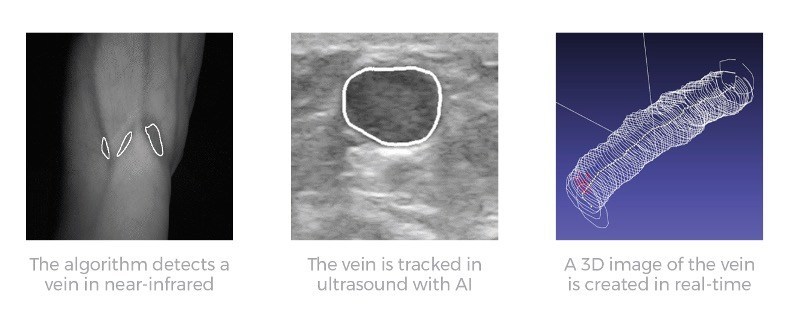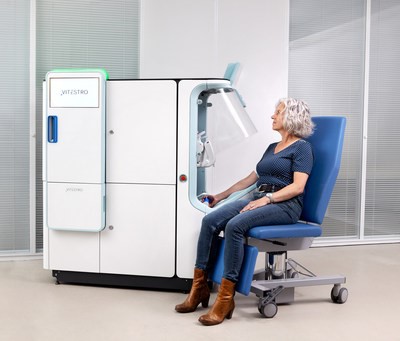Vitestro unveils autonomous blood drawing device, combining artificial intelligence, ultrasound imaging and robotics
Vitestro, a Dutch medical robotics company, today unveiled the world's most advanced autonomous blood drawing device at the annual meeting of the Netherlands Society for Clinical Chemistry and Laboratory Medicine (NVKC) in Rotterdam. Vitestro's device combines AI-based, ultrasound-guided 3D reconstruction with robotic needle insertion, ensuring accurate and secure blood collection. The venipuncture technology is adaptable to patients of 16 years of age onwards, comorbidities, and puncture difficulty. From 2023, Vitestro will initiate pivotal clinical studies for regulatory approval in Europe. EU-market introduction is anticipated in 2024.
Healthcare shortages spark revolutionary developments
Within healthcare, the clinical laboratory is the driving force. Accuracy and timeliness of laboratory tests are critically important, as they shape approximately 70% of all medical decisions made by physicians. It is unsurprising that blood collection ("phlebotomy") is the most common invasive medical procedure, performed billions of times per year globally. Blood collection holds a pivotal role in clinical diagnostics yet is also burdened by the scarcity of skilled workers. By automating this labor-intensive procedure, we can transform the quality of care and create a sustainable healthcare system.
Proprietary laboratory automation technology standardizes handling of the blood sample while the blood is collected. The device allows almost complete automation of the pre-analytical phase. This has the potential to reduce high blood test error rates, mainly caused by manual variability. In clinical studies, Vitestro already performed 1,500 automated blood draws in more than 1,000 patients with its prototype.

Toon Overbeeke, Vitestro's Co-Founder and Chief Executive Officer said: "The mounting shortage of healthcare personnel is imminent. The pandemic has further led to loss of workforce, causing a bleak outlook for hospital output around the globe, and leading to reduced access and continuity of care. That's why revolutionary automation like our blood drawing device is inevitable to solve the industry's biggest problem."
Outpatient phlebotomy care is redefined
At first, Vitestro will implement the device in outpatient phlebotomy departments. Patients will have the option to choose between Vitestro's venipunture device or standard method. The device is intuitive to use, empowering patients to be self-reliant in the full blood collection procedure. In previous clinical trials, patients of all ages showed a high degree of openness, enthusiasm and willingness to adopt the innovation.
A trained healthcare professional is able to supervise several devices, managing multiple patients simultaneously. The increased efficiency enables hospitals and clinical laboratories to address workforce shortage or even free up staff and deploy them where they are really needed.
Toon Overbeeke, Vitestro's Co-Founder and Chief Executive Officer adds: "We have spent nearly five years on the development of this breakthrough medical device. All relevant disciplines are represented in our dedicated, specialized team of 35 people. To prepare for production and commercialization, the team will double in size in the next two years. We have clear momentum in the market and will be the first to bring autonomous technology to European hospitals. With our technology we can help to build a more robust and resilient healthcare system."
Anja Leyte, Director OVLG Laboratories, participating in clinical studies commented:
"By introducing automated blood drawing, high quality as well as capacity is guaranteed in our laboratories. Vitestro's technology helps solving staffing shortages at our blood drawing department and improving sample standardization. Patients are also very enthusiastic."
